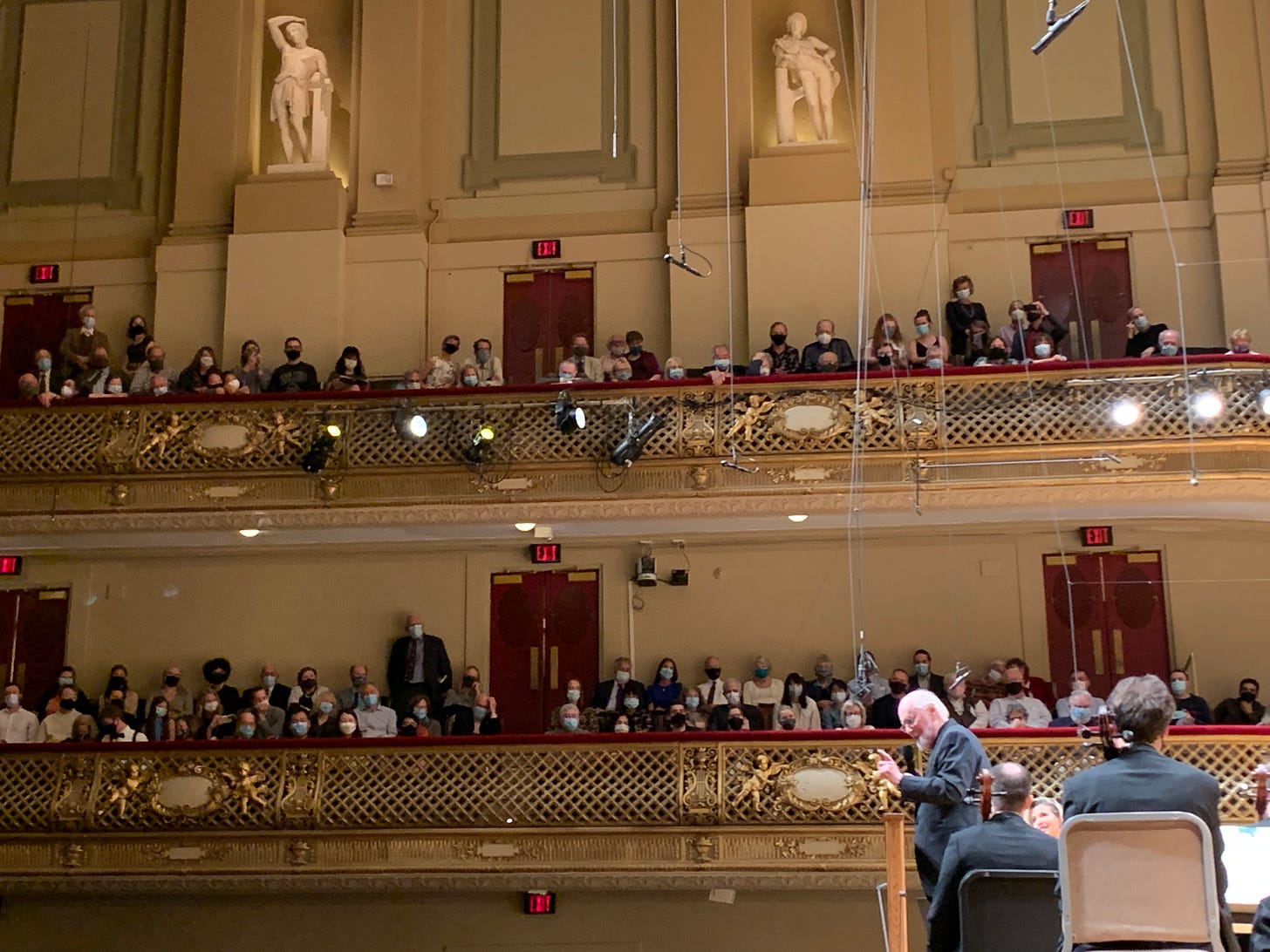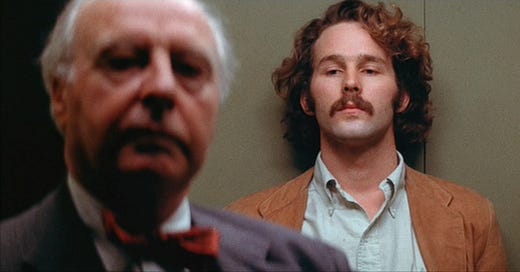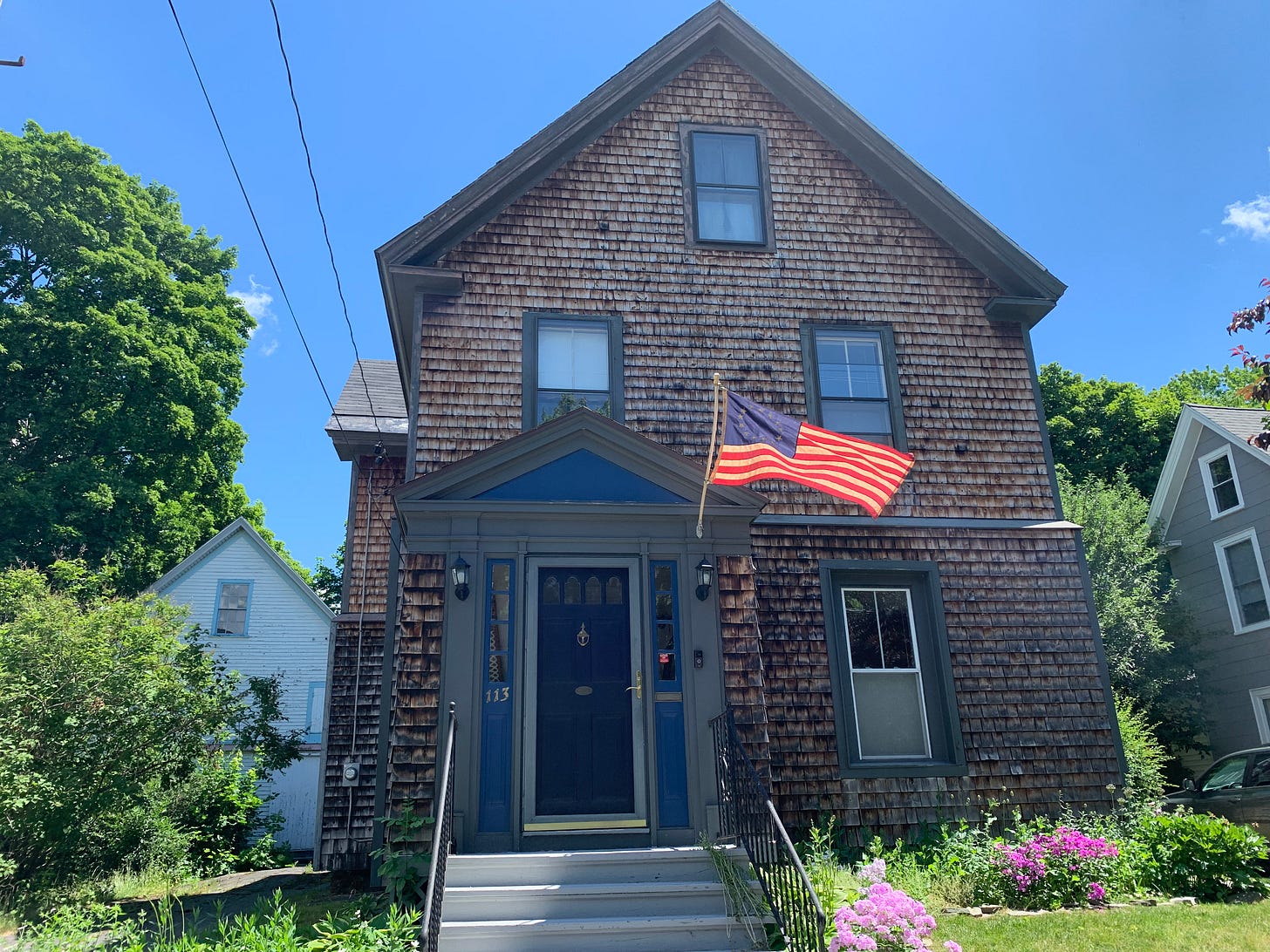How it all began
Let's go back to the beginning: how and why did I attempt to write a biography of the most private, and most famous, film composer alive?
In some ways, I could say I wanted to write a book about John Williams since I was that dweeby, homeschooled 9-year-old. But not consciously. It’s just that, in hindsight, my life was like a train where one track was a love of writing and the other was a love of his music. So, of course I should write a book about him—right?
My deep love of his music was the guiding force in my broader interest in film music, in my own noodling at the piano, in my wobbly trajectory into a career as a film music journalist. It was the thrill of my LIFE when I got to interview John for the first time in 2013 (for Classical KUSC), and at the end of our very short phone call I nervously squeaked out something about how his work altered the course of my life:
As my own career evolved, I had a few more opportunities to interview him when he was promoting a new project: The Force Awakens, Dear Basketball, Across the Stars. But I had just as many requests denied—much more in fact—and I found him to be one of the hardest “gets” to get. The widow of Georges Delerue (another great film composer) joked with me recently: “I heard that after you successfully passed the Cerberus dog gate, Mr. Williams is very pleasant.”
I first floated a proposal of writing his biography more than ten years ago, in a packet I sent via Sandy DeCrescent, his longtime orchestra contractor. I never heard anything back; who knows if he ever got it. A few years later I proposed to his agent doing a Spielberg-Williams coffee table book; nothing biographical, just a companion to their collaboration. That idea was (graciously) declined.
After I started teaching film music history at the University of Southern California in 2019, and upon the publication of a Max Steiner biography by my friend and mentor Steven C. Smith, I cold-emailed the editor at Oxford University Press who was responsible for that book, Norm Hirschy, and asked if OUP might be interested in other books on film music. I was thinking about the curriculum I had just developed for my USC class, and proposed doing a popular history of the art form. Norm instantly dismissed that idea, and asked what I would most want to write. Without thinking, I just blurted out, “Well, I’d most want to write a biography of John Williams—but that’ll never happen, because he’d never allow it.” Norm couldn’t believe there wasn’t a proper biography of John Williams, and he informed me that OUP mostly publishes unauthorized biographies anyway, so that was no problem. He simply asked me how litigious John was.
Suddenly, I was off to the races.

But this is where it gets complicated... because I didn’t want to write an unauthorized biography of John Williams, my idol. I wanted him to be involved. I wanted to interview him at length. At the very least, I wanted his blessing. Knowing he was fundamentally, resolutely against biographical projects about him, I somehow hoped the name “Oxford University Press” and some strong momentum might convert him, so I quietly set about writing a proposal which included a sample chapter, interviewing directors Oliver Stone, Barry Levinson, and Jean-Jacques Annaud as well as some session musicians as I crafted my chapter on the early ’90s (not coincidentally the chapter that covered Jurassic Park). This was right at the beginning of the pandemic, so everyone was stuck in their homes and I was able to secure interviews quite easily because these directors were trapped with nothing else to do. The book was my pandemic project, which is why I have almost nothing but fond memories of that strange and uniquely awful era.
I completed my proposal, which was accepted by Norm (who encouraged and helped me every step of the way) and sent out to anonymous “peers” for review. The feedback was somewhat mixed but mostly affirming, and the team at OUP convened to decide my fate. Norm told me about one internal meeting where several people spontaneously started humming John’s melodies; like Norm, they couldn’t believe a book like this had never been written. One of my peer reviewers accused me of sounding arrogant and nitpicked a few mistakes in my proposal. I always suspected it was this anonymous academic who started telling others about my embryonic project; I heard from a good friend that there were already rumors circling in the film music fan community that I was writing a salacious, gossipy book about John Williams. I panicked, because a) that wasn’t remotely true, and b) I still hadn’t made my overture to John! I was terrified that this bad-faith rumor would reach his team—and him—before I could.
So I jumped way ahead in my strategic timeline and called John’s agent. He said he hadn’t heard any such rumors (phew), but also that John would never change his mind about wanting a biography. He kindly agreed to take my (verbally and hastily rambled) proposal to John, repeating the phrase: “But I know what he’s going to say.” A few weeks later I got a phone call on a Wednesday evening during dinner: it was John’s agent and consigliere on the line together, calling to confirm that they had spoken to John about my book and—as they foresaw—he had no interest in participating. The agent assured me it had nothing to do with me personally, that this was just the way it was. I clumsily tried to gather more details about why and what exactly John objected to, and asked if he would take action against the book if I went ahead with it. They assured me that, since I’m a professional writer, he would never try and stop me. “But how would he feel about it?” I said, suddenly turning into a vulnerable nine-year-old boy. “He,” the consigliere said, taking a pregnant pause, “would not be pleased.”
It was something like a dark night of the soul. I was on the cusp of my first book contract, which felt like the great rite of passage as a writer—and I was getting to write a book about my favorite artist of all time, my idol. But my idol didn’t want me to do it!
I talked about it endlessly with Alison. She was genuinely scared—not just of possible bad blood from John and his team, but from the wider film music community, the fans, the internet trolls. I discussed it with my parents, my siblings, friends, mentors. Most of them said I should proceed; some said John would surely come around. The most powerful voice in my ear was Steven Smith’s, who had written the Bernard Herrmann biography that really inspired me and cast a vision for the kind of film music books I wanted to write, and who had produced countless high-profile film biographies of Hollywood stars. He had ample experience to know that some very famous or reclusive or difficult celebrities who initially refused to participate in these projects—even ones who threatened to take legal action—often eventually softened and joined in. Steven’s modus operandi was always to be polite but resolute, to insist the biography was happening with or without their participation, but to promise that he was going to do everything he could to ensure it was an accurate and respectful account of that person’s life. He gave me endless encouragement and strength, patiently listened to me babble about my fears, and convinced me I was doing the right thing by moving forward. When the official contract from OUP arrived, with the reluctant but loving support of my wife, I signed it.
The next year and a half was mostly a joy. I loved researching John’s life and career, watching all of his movies and discovering his old albums, sifting through thousands of pages of newspaper and magazine archives which had—blessedly—been digitized and made searchable. Investigating his ancestry was a huge puzzle; I had never done anything like the kind of records searching and sleuthing that was required. I asked for lots of help and reached out to several other biographers for advice and commiseration, and when I heard about Biographers International Organization (BIO) I immediately joined. I interviewed dozens and dozens of people: studio musicians, orchestra administrators, film directors, and even actors. (I didn’t really need to do the latter, but I just wanted an excuse to talk to Richard Dreyfuss—who was kooky and, recent bizarre outbursts aside, delightful.)
I tracked down high school classmates, old session players who remembered “Johnny’s” studio keyboard days, located his longtime music editor, Ken “Wampi” Wannberg, in Oregon, phoned Leslie Bricusse in France, and talked to Henry Mancini’s widow, Ginni, not long before she died. In fact, several people I talked to died during my work on this book—which infused it with an extra sense of urgency and purpose.
Not everyone would ask “Does John know about this? Is it authorized?” but I steeled myself for those questions every time an interview began, and I had a loose script prepared that aimed somehow to be truthful but without scaring the person away. That was a hard line to walk, and I hated feeling like I might in any way be deceiving people (I wasn’t, but I was definitely dancing around the elephant). One or two people, upon hearing the book wasn’t authorized by John, ended our call early or turned me down by email. Some sounded apologetic; a few sounded indignant. I’ll never know how many people declined my requests without any explanation, or who just never responded at all, because of my situation.
Early in the process, I cold-emailed John’s daughter, Jenny—whom I had never met. She very politely wrote back and said the family policy was to keep their private lives private, and therefore she had to decline speaking with me… but she added: “I’m thrilled to hear you’re writing a biography though! Good luck with all of it.” That line was jet fuel for my engine—his daughter is thrilled I’m writing it. Maybe she was just being polite, but now I kind of felt like I had the family’s quasi blessing. The other Williams in my corner was John’s youngest brother, Don, who was quietly encouraging me and sharing a few things off the record. I knew he wanted me to succeed, and I am so grateful for his support.
One terrifying day came in August 2021. I was at Disneyland with Alison, and we had just parked when I received an email from (the late) Anne Parsons, who had worked with John at the Boston Pops and given me a very nice interview. She wrote that she had “just received information that indicates he has not approved your book and wishes those of us who have been contacted by you would decline interviews,” and sweetly asked me not to use any of our conversation. My heart sank. This was a new development, and a troubling one. I could reconcile my project as long as I heard nothing from John and had no indication he was actively moving against it. Literally 40 minutes later, as we were in line for our morning coffee on Disneyland’s Main Street, I got another email—this one from Bill Cosel, the creator of Evening at Pops who worked closely with John and remained his friend and had given me a wonderfully insightful interview. “When I discovered John hadn’t authorized a book about his work, including comments from those who attended him, I realized I should have called John first,” Cosel wrote. “I regret that. As you probably can tell many of us are very trusted and as we all know he’s a very private man. Please don’t include my comments as you continue your work on the book.”
Disneyland was not the happiest place on earth that particular day.
This was another crucible, and I gave serious thought to packing it all in. I had hit mostly green lights until now, despite not having John’s participation, but this felt like driving full speed into a brick wall. I imagined a hundred more emails flooding into my inbox from folks I had interviewed, demanding I not use their comments. (That never happened; those two emails were the only two I ever received.) I started to doubt my own integrity, questioning if, in my efforts to secure participants, I was being sneaky. And I thought about the bad blood that must be brewing between me and my idol—and that was a rotten, sour feeling. I drafted a letter to John’s agents that apologized for any damage done, begging for John’s forgiveness, and announcing that I would be abandoning the book. I also drafted a different letter that apologized and begged, but clarified why I was going to continue with the book. I made a pros and cons list of my options—one of which was just to hold off until John died. He was 89, so it wasn’t an entirely unreasonable thought. I thought: this would be so much easier and less stressful that way. I called Norm and spilled all my fears and feelings, and he very calmly held my proverbial hand and talked me off the ledge. As did Steven Smith, who gave a more fiery sermon than usual about staying the course; I was doing the right thing, he said, and he didn’t want “the bad guys” to win and defeat me. So, with fear and trepidation, I kept going…

There weren’t many other red lights. I kept securing numerous additional interviews, and went on a wonderful research trip in the summer of 2022; Ali and I attended two of the 90th birthday concerts at the Kennedy Center, then took a train to New York where I visited John’s childhood homes and elementary school in Flushing, then went to Boston, then to Maine, where we tracked down the homes and stomping grounds of his paternal ancestors.
The one hitch in this delightful, inspiring adventure was when my request to visit the Boston Symphony Orchestra archives was declined because they learned that “John has not authorized this book and is not in favor of its publication,” according to an email I received. “We have great respect for his wishes and therefore have decided that we can’t provide you with access to the Archives.” I wasn’t so much scared by this as I was angry. I couldn’t understand why a wrench like this was now being thrown into my efforts. And wasn’t this a public archive? But I put it behind me and still had a fantastic trip with Ali.
I never actually knew what John thought. I heard second and third-hand that he “wasn’t pleased,” that he wasn’t in favor, that he didn’t want people talking to me—but I never actually got to hear from John himself. Nor did I get to make a direct appeal to him; all communication was through intermediaries, and those being watchdogs whose paid mission is to keep lots of people and requests from even entering the castle. So even though I assumed it was true that John did not want this book to happen, it bothered me that I never got to have the conversation with him.
I had his home address—I literally stumbled on it doing research—so I decided in August 2021 to send him a letter directly: introducing myself, explaining my reasons for writing this book, hopefully dispelling any worrisome beliefs about it that he might have, and making the most personal, emotional appeal possible for him to become involved or, at the very least, give me his blessing. I sent it with as much optimistic manifestation energy as I could muster.
A year went by with no response.
I was nearing my original, contractual deadline—December 2022—to submit the manuscript, and I decided to write John another letter. It was a status update and another personal, emotional appeal. I was actually sitting in a gastroenterologist’s office, one of the more humbling places to be, when my phone pinged with an email from John’s consigliere. The subject was: “JW Reply To Your Letter.”
To be continued…











I can’t wait to hear what happens next (and I already know!). What a terrific, personal account of overcoming a hard “no.” I hope your students read this, along with anyone struggling to overcome an Indiana Jones-sized boulder in their path.
I really hope next week’s post is the continuation of this; I can’t wait to read what happened next, especially when in the previous post you ended with the following: “And then, one morning in September 2022, I got an email: “John is wondering if you might be available for a brief off-the-record meeting this Thursday at his studio.”” What a tremendous process and I really admire your commitment and humility, as well as giving tremendous respect to the Maestro himself. I can’t wait to find out what happened next and learn more about how John Williams finally got personally involved with the book.